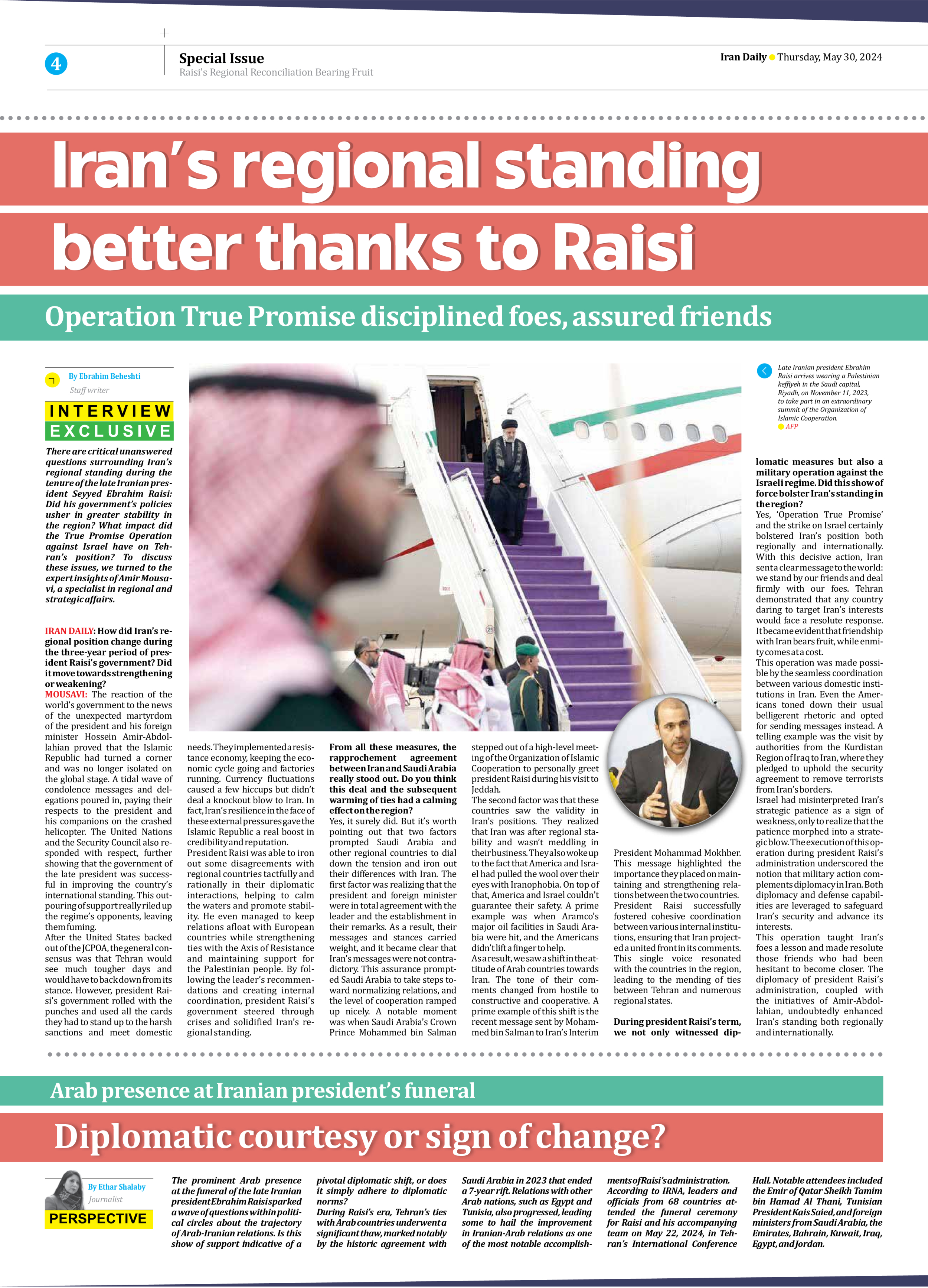
Iran’s regional standing better thanks to Raisi
Operation True Promise disciplined foes, assured friends
There are critical unanswered questions surrounding Iran’s regional standing during the tenure of the late Iranian president Seyyed Ebrahim Raisi: Did his government’s policies usher in greater stability in the region? What impact did the True Promise Operation against Israel have on Tehran’s position? To discuss these issues, we turned to the expert insights of Amir Mousavi, a specialist in regional and strategic affairs.
By Ebrahim Beheshti
Staff writer
IRAN DAILY: How did Iran’s re IRAN DAILY: How did Iran’s regional position change during the three-year period of president Raisi’s government? Did it move towards strengthening or weakening?
MOUSAVI: The reaction of the world’s government to the news of the unexpected martyrdom of the president and his foreign minister Hossein Amir-Abdollahian proved that the Islamic Republic had turned a corner and was no longer isolated on the global stage. A tidal wave of condolence messages and delegations poured in, paying their respects to the president and his companions on the crashed helicopter. The United Nations and the Security Council also responded with respect, further showing that the government of the late president was successful in improving the country’s international standing. This outpouring of support really riled up the regime’s opponents, leaving them fuming.
After the United States backed out of the JCPOA, the general consensus was that Tehran would see much tougher days and would have to back down from its stance. However, president Raisi’s government rolled with the punches and used all the cards they had to stand up to the harsh sanctions and meet domestic needs. They implemented a resistance economy, keeping the economic cycle going and factories running. Currency fluctuations caused a few hiccups but didn’t deal a knockout blow to Iran. In fact, Iran’s resilience in the face of these external pressures gave the Islamic Republic a real boost in credibility and reputation.
President Raisi was able to iron out some disagreements with regional countries tactfully and rationally in their diplomatic interactions, helping to calm the waters and promote stability. He even managed to keep relations afloat with European countries while strengthening ties with the Axis of Resistance and maintaining support for the Palestinian people. By following the leader’s recommendations and creating internal coordination, president Raisi’s government steered through crises and solidified Iran’s regional standing.
From all these measures, the rapprochement agreement between Iran and Saudi Arabia really stood out. Do you think this deal and the subsequent warming of ties had a calming effect on the region?
Yes, it surely did. But it’s worth pointing out that two factors prompted Saudi Arabia and other regional countries to dial down the tension and iron out their differences with Iran. The first factor was realizing that the president and foreign minister were in total agreement with the leader and the establishment in their remarks. As a result, their messages and stances carried weight, and it became clear that Iran’s messages were not contradictory. This assurance prompted Saudi Arabia to take steps toward normalizing relations, and the level of cooperation ramped up nicely. A notable moment was when Saudi Arabia’s Crown Prince Mohammed bin Salman stepped out of a high-level meeting of the Organization of Islamic Cooperation to personally greet president Raisi during his visit to Jeddah.
The second factor was that these countries saw the validity in Iran’s positions. They realized that Iran was after regional stability and wasn’t meddling in their business. They also woke up to the fact that America and Israel had pulled the wool over their eyes with Iranophobia. On top of that, America and Israel couldn’t guarantee their safety. A prime example was when Aramco’s major oil facilities in Saudi Arabia were hit, and the Americans didn’t lift a finger to help.
As a result, we saw a shift in the attitude of Arab countries towards Iran. The tone of their comments changed from hostile to constructive and cooperative. A prime example of this shift is the recent message sent by Mohammed bin Salman to Iran’s Interim President Mohammad Mokhber. This message highlighted the importance they placed on maintaining and strengthening relations between the two countries.
President Raisi successfully fostered cohesive coordination between various internal institutions, ensuring that Iran projected a united front in its comments. This single voice resonated with the countries in the region, leading to the mending of ties between Tehran and numerous regional states.
During president Raisi’s term, we not only witnessed diplomatic measures but also a military operation against the Israeli regime. Did this show of force bolster Iran’s standing in the region?
Yes, ‘Operation True Promise’ and the strike on Israel certainly bolstered Iran’s position both regionally and internationally. With this decisive action, Iran sent a clear message to the world: we stand by our friends and deal firmly with our foes. Tehran demonstrated that any country daring to target Iran’s interests would face a resolute response. It became evident that friendship with Iran bears fruit, while enmity comes at a cost.
This operation was made possible by the seamless coordination between various domestic institutions in Iran. Even the Americans toned down their usual belligerent rhetoric and opted for sending messages instead. A telling example was the visit by authorities from the Kurdistan Region of Iraq to Iran, where they pledged to uphold the security agreement to remove terrorists from Iran’s borders.
Israel had misinterpreted Iran’s strategic patience as a sign of weakness, only to realize that the patience morphed into a strategic blow. The execution of this operation during president Raisi’s administration underscored the notion that military action complements diplomacy in Iran. Both diplomacy and defense capabilities are leveraged to safeguard Iran’s security and advance its interests.
This operation taught Iran’s foes a lesson and made resolute those friends who had been hesitant to become closer. The diplomacy of president Raisi’s administration, coupled with the initiatives of Amir-Abdollahian, undoubtedly enhanced Iran’s standing both regionally and internationally.







